Migrants, police mass in town on Guatemala-Mexico border
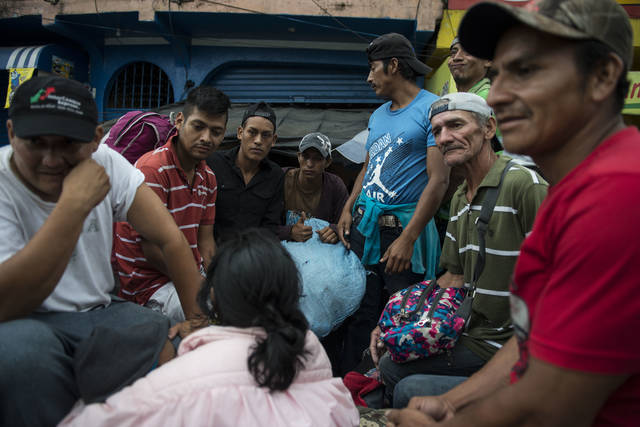
Honduran migrants ride on the bed of a pick-up truck towards the Mexican border, in Mazatenango, about 200 miles north-west from Guatemala City, Guatemala, Thursday, Oct. 18, 2018. Many of the more than 2,000 Hondurans in a migrant caravan trying to wend its way to the United States left spontaneously with little more than the clothes on their backs and what they could quickly throw into backpacks. (AP Photo/Oliver de Ros)’
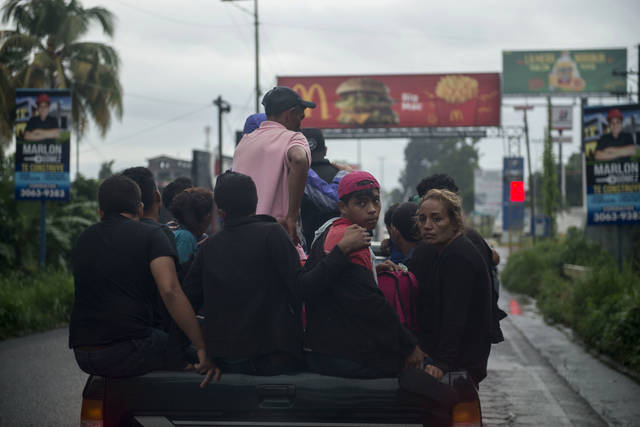
Honduran migrants ride on the bed of a pick-up truck towards the Mexican border, in Mazatenango, about 200 miles north-west from Guatemala City, Guatemala, Thursday, Oct. 18, 2018. Many of the more than 2,000 Hondurans in a migrant caravan trying to wend its way to the United States left spontaneously with little more than the clothes on their backs and what they could quickly throw into backpacks. (AP Photo/Oliver de Ros)’
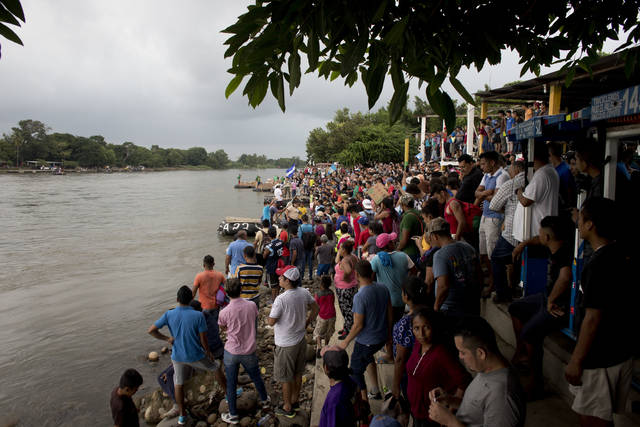
Hundreds of Honduran migrants stand at the shore of the Suchiate river on the border between Guatemala and Mexico, in Tecun Uman, Guatemala, Thursday, Oct. 18, 2018. Mexico’s foreign ministry says government officials at its southern border with Guatemala have started assisting the early arrivals from a caravan of some 3,000 Honduran migrants that has drawn sharp criticism from U.S. President Donald Trump. (AP Photo)
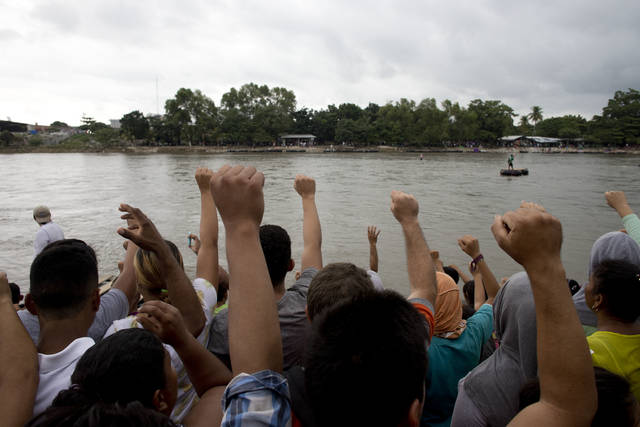
Honduran migrants sing their national anthem standing standing at the shore of the Suchiate river on the border between Guatemala and Mexico, in Tecun Uman, Guatemala, Thursday, Oct. 18, 2018. Mexico’s foreign ministry says government officials at its southern border with Guatemala have started assisting the early arrivals from a caravan of some 3,000 Honduran migrants that has drawn sharp criticism from U.S. President Donald Trump. (AP Photo)
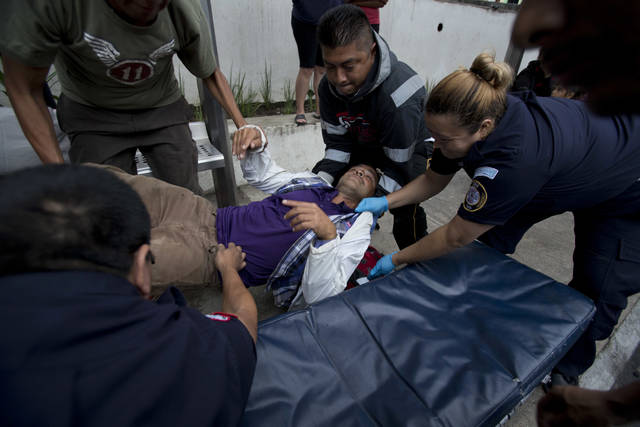
Paramedics attend Honduran migrant Jose Alainez, 49, who suffered an epileptic seizure while walking north with other migrants, before taking him to the hospital in Guatemala City, early Thursday, Oct. 18, 2018. Alainez, traveling alone, had to leave the caravan of more than 2,000 Hondurans trying to wend its way to the United States. (AP Photo/Moises Castillo)
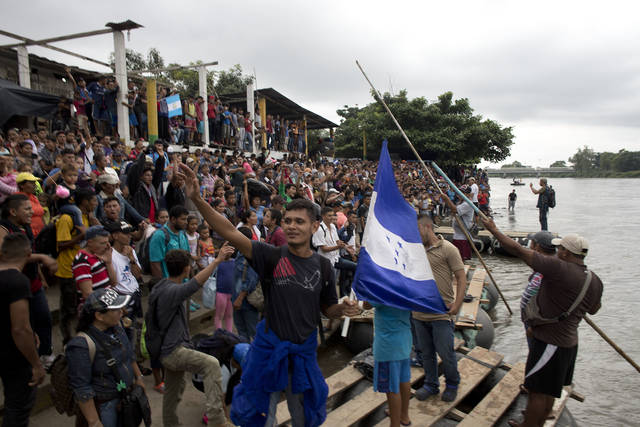
Hundreds of Honduran migrants stand at the shore of the Suchiate river on the border between Guatemala and Mexico, in Tecun Uman, Guatemala, Thursday, Oct. 18, 2018. Mexico’s foreign ministry says government officials at its southern border with Guatemala have started assisting the early arrivals from a caravan of some 3,000 Honduran migrants that has drawn sharp criticism from U.S. President Donald Trump. (AP Photo)
TECUN UMAN, Guatemala — Members of a 3,000-strong migrant caravan have massed in this Guatemalan border town across the muddy Suchiate River from Mexico, as U.S. President Donald Trump threatens retaliation if they continue toward the United States.
TECUN UMAN, Guatemala — Members of a 3,000-strong migrant caravan have massed in this Guatemalan border town across the muddy Suchiate River from Mexico, as U.S. President Donald Trump threatens retaliation if they continue toward the United States.
The first members of the group began arriving in Tecun Uman on buses and trucks early Thursday, but the bulk of the caravan sloshed into town on foot in a downpour late in the afternoon and into the evening. Hundreds walked to the river’s edge where they sang the national anthems of Honduras and Guatemala.
A smaller group walked to the border crossing but was blocked by Guatemalan police. They eventually retreated to await the rest of the caravan.
The exhausted travelers, the majority from Honduras, dispersed to the local migrant shelter and parks where volunteers offered them food.
Jonathan Perales, 22, arrived with his wife Heidy and their daughters ages 2 and 4. They’d been traveling since 4 a.m. and arrived at the border after dark. They paid for bus tickets they could ill afford.
“It was a great sacrifice, but it’s all for a better life,” he said. “It’s not all good. We’re wet and we still don’t have a place to sleep.”
On the Mexican side, the foreign ministry said its government was in constant communication with members of the caravan explaining the migrants’ options. It said officials were already assisting some migrants who had crossed and requested refugee status.
Trump has made it clear to Mexico that he is monitoring its response. Early Thursday, he threatened to close the U.S. border if Mexico let the migrants advance. Later, he retweeted a video of Mexican federal police arriving at the Guatemalan border and wrote: “Thank you Mexico, we look forward to working with you!”
Two busloads of those police were visible on the Mexican side of the bridge from Tecun Uman Thursday. Metal barricades were stored to one side, but not yet deployed.
Edgar Corzo of Mexico’s National Human Rights Commission expressed concern about the police deployment in Ciudad Hidalgo.
“We hope that the immigration officials and federal police have a humanitarian understanding,” Corzo said. He said they were “worried that things could escape rational margins.”
Mexico’s southern border is notoriously porous and it was unclear how many of the migrants would attempt to cross legally at the bridge.
Some migrants crossed the river at a point where they could walk through shallow water Thursday, Corzo said. Others could opt for the rafts that ferry people — and historically migrants — daily across the river.
“How they’re going to cross is what we’re anxious about,” he said.
Tensions rose Thursday when an immigration activist who led a migrant caravan through Mexico last spring was arrested by federal police and immigration agents in Ciudad Hidalgo on the Mexican side of the border.
Irineo Mujica’s organization, Pueblo sin Fronteras or People without Borders, said he was detained during a peaceful march. Video circulating on social media saw several police and immigration agents pushing Mujica into an immigration agency van in a crowd of people. Mujica appeared to be resisting.
Corzo said police accused Mujica of slashing the tires of an immigration vehicle. Immigration officials said later in a statement that Mujica, who has dual U.S.-Mexican citizenship, is accused of property damage. It said Mujica attacked immigration agents, as well as local and federal police, after he was asked for his identification.
Mexico has said the Hondurans would not be allowed to enter as a group and would either have to show a passport and visa — something few have — or apply individually for refugee status, a process that can mean waiting for up to 90 days for approval. They also said migrants caught without papers would be deported.
Thursday night, a man from Pueblo Sin Fronteras who did not give his name, told migrants in Tecun Uman that they would try to cross en masse on Saturday morning.
In April, Mexican immigration officials had some success in dispersing the smaller caravan by processing many who decided to seek refugee status in Mexico, but some did continue on to the U.S. border where they were processed over several days.
Three weeks before U.S. midterm elections, Trump has seized on the caravan as a political winner for Republicans.
Early Thursday he tweeted: “I must, in the strongest of terms, ask Mexico to stop this onslaught — and if unable to do so I will call up the U.S. Military and CLOSE OUR SOUTHERN BORDER!” Trump tweeted, adding that he blamed Democrats for what he called “weak laws!”
Marcelo Ebrard, who is set to become foreign relations secretary when President-elect Andres Manuel Lopez Obrador takes office Dec. 1, said Trump’s tweets need to be understood in the context of the upcoming U.S. midterm elections.
“The electoral process is very near, so he is making a political calculation,” Ebrard said in an interview with Radio Centro.
Trump’s stance, he said, was “what he has always presented,” adding he saw “nothing surprising in it.”
Current Foreign Relations Secretary Luis Videgaray was also sanguine and viewed things through the lens of U.S. politics.
“Nobody likes them (Trump’s comments). There’s no reason to give them greater transcendence or importance,” Videgaray said from the United Nations where he sought the world body’s help processing asylum requests from the migrants. “What is important to us is the migrants, respect for human rights, their due protection, particularly the most vulnerable.”
Like Guatemala and Honduras, Mexico is a country of many migrants, raising the question of whether the political will exists for a confrontation.
Lopez Obrador wants to avoid repression against migrants and also to avoid angering the United States. He said this week that Mexico would offer jobs to Central Americans.
“Anyone who wants to work in our country … will have a work visa,” he said.
Juan Escobar, 24, said he had heard about Trump’s comments but said they would not dissuade the migrants from continuing their journey.
“Only God on high can stop us,” Escobar said.
———
Maria Verza in Mexico City contributed to this report.

